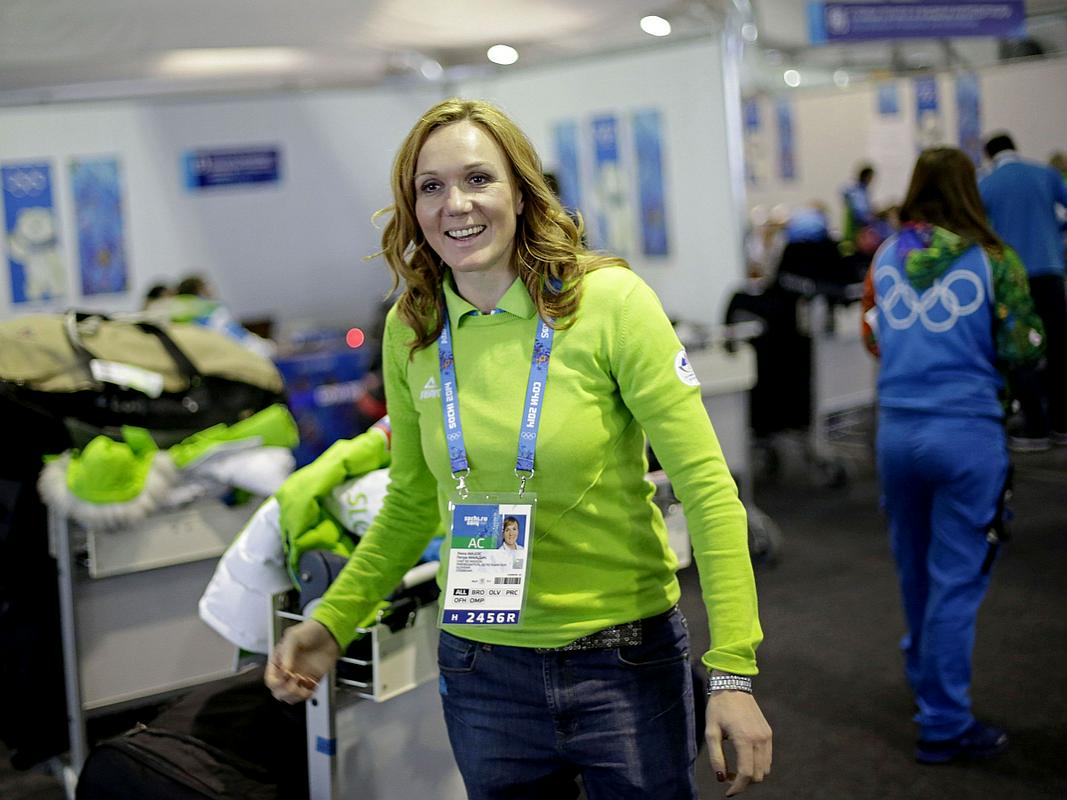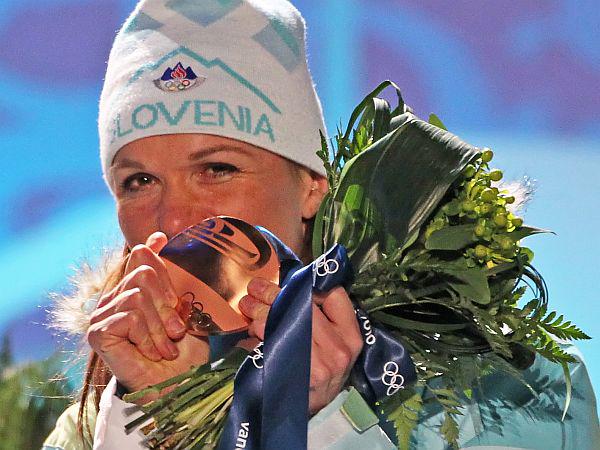
• Shayba Arena – ice hockey; 7,000 spectators
• Adler Arena – ice skating; 8,000 spectators
• Iceberg Skating Palace – figure skating, short track speed skating; 12,000 spectators
• Ice Cube Curling Center; 3,000 spectators
• Fisht Olympic Stadium – ceremonies; 40,000 spectators
• Main Olympic Village International Broadcast Centre
• ‘Rosa Khutor’ Extreme Park – freestyle skiing and snowboarding
• ‘Rosa Khutor’ Alpine Centre – Alpine skiing
• ‘Sanki’ Olympic Sliding Centre – bobsleigh, luge
• ‘RusSki Gorki’ Jumping Centre – ski jumping and Nordic combined (ski jumping)
• Rosa Khutor Plateau

As the best Slovenian cross-country skier, this is your first time as leader of the national team at a Winter Olympics. Which role is more demanding?
Training was undoubtedly more demanding, at least in the physical and psychological sense. Regarding stress and timing, my new role is more challenging. If I was able to schedule my own time before, this is no longer possible. My schedule now changes by the hour and is not only up to me anymore, but influenced by other people. This work demands a lot of time, which sportspeople during their active careers don’t have. In addition, I have my own company, which also requires a whole person, so I don’t have a lot of personal time. People have been working on this project for a year and a half, and I am certain that nothing will go wrong, regardless of who heads the delegation. I have full support and assistance of all the expert services of the Olympic Committee of Slovenia. However, my appointment to this position shows that there is a tendency in sport to actively include more former sportspeople in various roles.
When will the final list of passengers for Sochi be known?
Sixty-six candidates are confirmed, but of course the number can change, because all candidates must verify their qualifying performance in the current season. The number of members of the hockey team is known, i.e. twenty-five, but the names are decided by the coach or the Ice Hockey Federation of Slovenia. All the other sportspeople (not only candidates) have until 21 January to meet their qualifying requirements. Many world cup events will be held until then, where people will have the opportunity to verify their points and qualify for 2014 Winter Olympics in Sochi.
How will you combine all sections of the national team, which will be quite dispersed at different venues?
As I said before, an excellent and experienced operational team has been working for a year and a halfto provide that the venues are connected to one another as much as possible. The accommodation for competitors and other staff must be booked in advance, as well as plane tickets and additional luggage. My role is to assist them in any disputes that may arise; in short, to help them with unforeseen problems. As a former active sportswoman, my advantage is undoubtedly in the fact that I will be able to assess and anticipate the best circumstances and solutions for them. There will be three Olympic villages; two large ones and one smaller for endurance sports. The villages are about 45 km apart. Roles have been assigned already and accommodation arranged. Our ‘headquarters’ will be in the village of Krasnaja Poljana. The exact route of the road connections between the venues is still unknown because, as far as I know, the venues are in the final construction phase. An express train was mentioned a while ago, but we don’t have any reliable information on that right now.
Are you expecting problems when moving from one venue to another?
Problems with transportation between the villages are possible. For example, for award ceremonies which will take place in Sochi, competitors will have little time due to all the obligations at the competition venue (flower ceremony, press conference, drug tests) to make it to the official award ceremony in Sochi. The award ceremony programme will probably be adjusted and the presentation of medals for each competition will not be held on the same day as the competition. It will be difficult to quickly, timely and efficiently coordinate transport between the villages, but the operational team and individual competitors and their teams have vast experience from world cups and I am certain that we will succeed. I will try to be present at all venues, which means that we will be very mobile. The hosts have guaranteed us a high level of security. Sochi is not very populated and there is a lack of accommodation facilities, which has been solved by cruise ships, which will serve as substitute hotels.
The weather conditions may also be very unpredictable.
That is true. There is a lot of snow at the venue currently, but a warm wind could blow and it will be gone. There is a big difference between artificial and natural snow, but we are not always aware of that. The spectators and sponsors expect results, but many things depend on luck, including the weather and such. I expect the security and weather conditions to be extreme in a way. If one metre of snow falls, we will be unable to move between the villages quickly. Two cable-cars will be running into two villages in the hills, one for competitors and one for spectators. The problem is that we don’t know how many people they will be able to take. You see, when there are no people there, everything works perfectly, but once there is a mass of people, unpredictable complications may arise. But I don’t think many spectators will come to the Olympics, mainly because of difficult access by cable-car and car.
Slovenia House will be absent this time, as at the London Summer Olympics.
That is true, unfortunately. Because the Russians have set extreme prices for putting up the house or renting property, we decided not to put up the house. Several alternatives are being explored, and the marketing team of the Olympic Committee of Slovenia is as always doing its best in this field. We are in discussions with one of our representations in Sochi to hold different events at their showroom. We are also exploring the option of leasing a hall for celebrations – if we win a medal – in the hotel below the Main Olympic Village, where FIS delegates are to be accommodated. We are all well aware of the situation that Slovenia copes with, and it remains to be seen whether it is wise for Slovenia House to be absent from the Olympics again. We must note that Slovenia House is not the responsibility of the Olympic Committee of Slovenia, but of Slovenian tourism, business and also the Government.
How will the promotion of Slovenia be implemented generally?
We have good past experience. The Olympic Committee of Slovenia has successfully cooperated with sponsors, and also organised a plane for Slovenian fans, and thus sent the largest organised delegation of fans to the London Olympics. The response was very good, and this will be repeated again on a smaller scale. The main promoters will be the team themselves. Slovenia’s best promotion will be its sportspeople, their results and also its recognised colours, which were already presented at the Summer Olympics. SPIRIT Slovenia will have to take care of everything else. Discussions are being held to arrange for high state and governmental representatives to come to the Olympics in Sochi.
What about the coordination of journalists and press conferences?
It will be conducted according to established guidelines. Journalists will be able to approach sportspeople regularly. I emphasise that sportspeople will be in the forefront and everything will work to their benefit. By this I mean that particularly the main candidates for medals have full schedules. They don’t have only one competition, and will be available to the press a day or two before their competitions. Journalists will have access to venues and press conferences will be organised when medals are awarded. The venue for press conferences will be in the Main Village. For example, the hockey team will have a press conference in Sochi, and journalists will have to be as flexible as us – the members of the organisational committee – while travelling from one village to another in order to interview competitors. But that will be decided on the spot. Before leaving for Sochi, the national team will be presented in Ljubljana on 23 January, where the team will be available to the press for interviews and also present their team outfits, etc.
What are your predictions for medals?
We have many superb competitors and many are candidates for medals. I am being asked why Slovenians perform much better at world cups than at the Olympics. The answer lies in the fact that large teams have many comparable competitors and we have only one; for example, there is only one Tina Maze, who must do her best in every race; there is no rest in between. As a rule, large nations withdraw their main favourites and only bring them to the Olympics, where they excel. We cannot afford to do that, because we are too few. But don’t worry, we will not return without a medal.
Vesna Žarkovič, SINFO
• Shayba Arena – ice hockey; 7,000 spectators
• Adler Arena – ice skating; 8,000 spectators
• Iceberg Skating Palace – figure skating, short track speed skating; 12,000 spectators
• Ice Cube Curling Center; 3,000 spectators
• Fisht Olympic Stadium – ceremonies; 40,000 spectators
• Main Olympic Village International Broadcast Centre
• ‘Rosa Khutor’ Extreme Park – freestyle skiing and snowboarding
• ‘Rosa Khutor’ Alpine Centre – Alpine skiing
• ‘Sanki’ Olympic Sliding Centre – bobsleigh, luge
• ‘RusSki Gorki’ Jumping Centre – ski jumping and Nordic combined (ski jumping)
• Rosa Khutor Plateau

































































